- Last Updated: February 16th, 2026
Key Takeaways
Social media's influence on body image can lead to positive and negative outcomes.
The promotion of body positivity on social media is critical for fostering healthy body image perception.
Ongoing efforts are required to mitigate the negative impact of social media on body image satisfaction.
Overview of Social Media and Body Image
On this page, we’ll explore the connection between social media and body image, the potential legal implications of social media’s impact on body image, steps to mitigate the negative effects of social media on self-esteem, and much more.
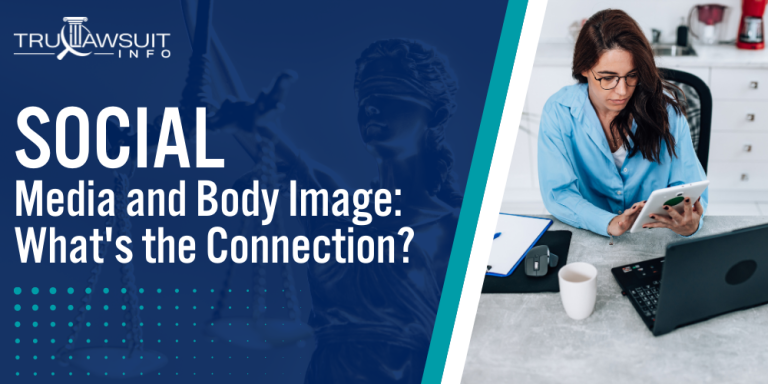
Intro to Social Media and Body Image
The rise of social media has brought with it a growing concern about its impact on body image, particularly among young people.
Here are some key ways social media can affect body image:
- Unrealistic Standards: Social media often promotes unrealistic beauty standards, leading to feelings of inadequacy and low self-esteem.
- Comparison Culture: Constant exposure to curated images of others’ lives can lead to unhealthy comparisons and negative body image.
- Cyberbullying: Body shaming and bullying on social media platforms can have severe psychological consequences for victims.
- Eating Disorders: Exposure to pro-anorexia and pro-bulimia content on social media can contribute to the development of eating disorders.
If you or a loved one has suffered from the negative impact of social media on body image, you may have legal options.
Contact Tru Lawsuit Info using the chat on this page to receive an instant case evaluation and determine if you qualify for legal action against social media giants.
Decreased Productivity in the Workplace
As social media permeates the workplace, it poses distinct challenges to employee productivity, specifically in terms of time spent on platforms and the resulting focus deviation from professional tasks.
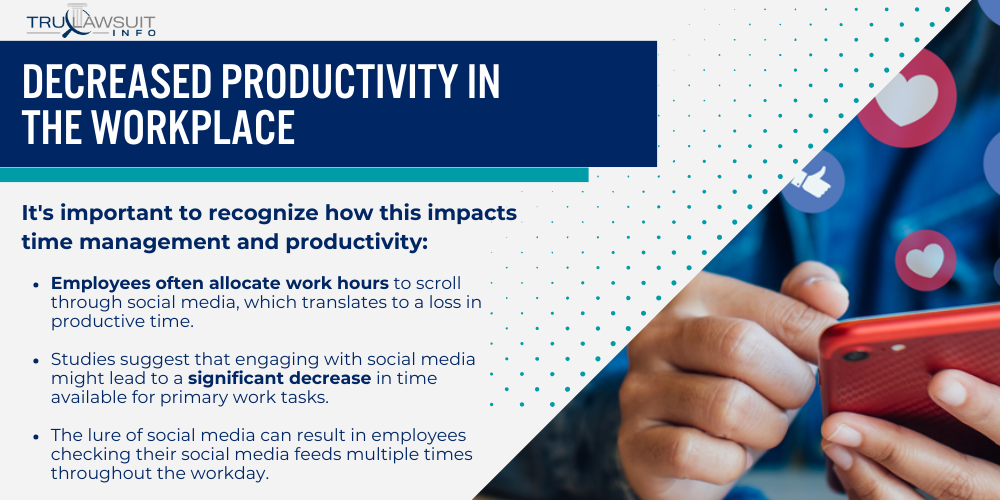
Lost Work Hours Due to Social Media Use
Spending time on social media platforms during work hours is not an uncommon occurrence.
It’s important to recognize how this impacts time management and productivity:
- Employees often allocate work hours to scroll through social media, which translates to a loss in productive time.
- Studies suggest that engaging with social media might lead to a significant decrease in time available for primary work tasks.
- The lure of social media can result in employees checking their social media feeds multiple times throughout the workday.
- This behavior can accumulate to a substantial portion of the workday dedicated to non-work-related activities.
Impact on Employee Focus and Efficiency
When employees frequently check social media, it often disrupts their workflow and distracts from their core responsibilities.
This shift in focus can decrease overall job performance, as the mind must constantly recalibrate between tasks.
Social media use also has a pronounced effect on an employee’s ability to maintain focus and efficiency at work:
- Frequent social media interruptions can fragment an employee’s attention, making it harder to return to a productive rhythm.
- Engaging with content on these platforms can lead to a decrease in concentration on immediate professional tasks.
- Prolonged use of social media during work hours may result in a noticeable reduction in work output and quality.
- Employees may experience fatigue due to the mental switch between work and social media, reducing overall work efficiency.
Increased Healthcare Costs
Social media’s impact on health extends beyond the screen, contributing to increased healthcare costs due to mental and physical ailments.
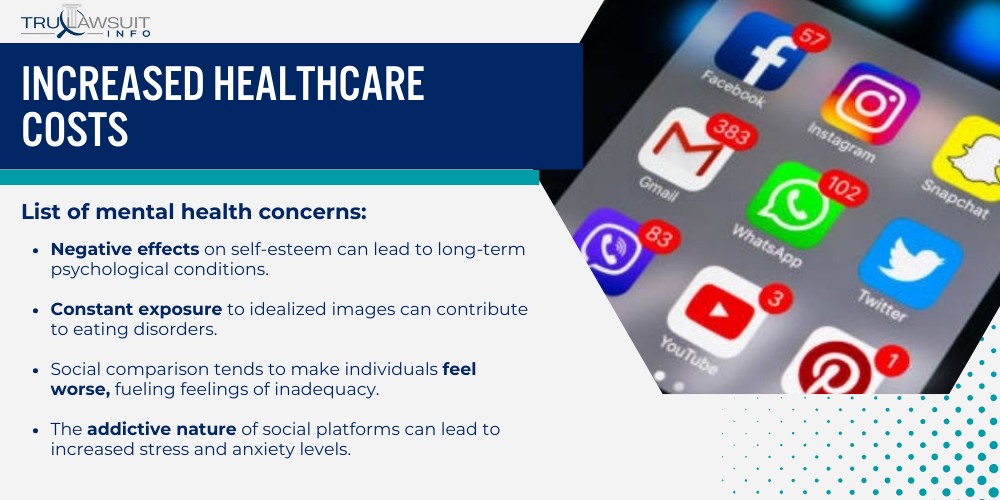
Mental Health Issues Linked to Social Media Addiction
Social media addiction is becoming a growing concern, often linked to mental health issues such as anxiety and depression.
List of mental health concerns:
- Negative effects on self-esteem can lead to long-term psychological conditions.
- Constant exposure to idealized images can contribute to eating disorders.
- Social comparison tends to make individuals feel worse, fueling feelings of inadequacy.
- The addictive nature of social platforms can lead to increased stress and anxiety levels.
These issues frequently result in a need for professional mental health services, which drives up healthcare spending.
Physical Health Problems Associated with Excessive Screen Time
Excessive screen time has been observed to contribute to various physical health problems.
Consequences of prolonged screen use:
- Sedentary behavior can lead to obesity and associated chronic diseases.
- Eye strain and discomfort, known as computer vision syndrome, are common.
- Poor posture from extended screen use can cause musculoskeletal issues.
- Disrupted sleep patterns due to blue light exposure can affect overall health.
The direct correlation between social media use and these health problems often necessitates medical intervention, contributing to the overall healthcare burden.
Legal Implications of Social Media Addiction
Addiction to social media can lead to a range of legal issues for both employers and individuals.
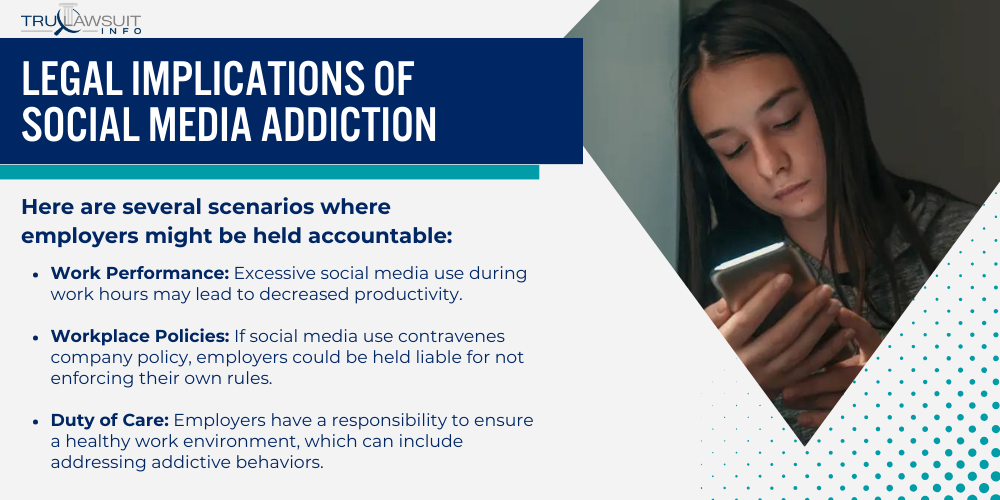
The risks may include potential liability for employers and confidentiality breaches that cause reputational harm.
Potential Liability for Employers
Employers may face legal challenges if employees’ social media use negatively affects the workplace.
Here are several scenarios where employers might be held accountable:
- Work Performance: Excessive social media use during work hours may lead to decreased productivity.
- Workplace Policies: If social media use contravenes company policy, employers could be held liable for not enforcing their own rules.
- Duty of Care: Employers have a responsibility to ensure a healthy work environment, which can include addressing addictive behaviors.
- Litigation Risks: Legal action may arise if an employee’s addiction to social media is linked to stress or mental health issues exacerbated by work.
Risks of Confidentiality Breaches and Reputational Damage
The misuse of social media can have significant legal consequences, particularly when confidential information is disclosed.
Key risks associated with social media include:
- Personal Data: Employees may inadvertently share sensitive personal or corporate information.
- Client Confidentiality: Leaks of client or customer data could lead to legal action and loss of trust.
- Public Perception: Negative posts or behaviors linked to a company can quickly damage its reputation.
- Legal Sanctions: Companies may face legal penalties if they fail to safeguard against breaches of confidentiality.
Societal Costs of Social Media Addiction
The escalation of social media addiction has undeniably rippled throughout society, incurring multifaceted costs that extend beyond individual well-being.
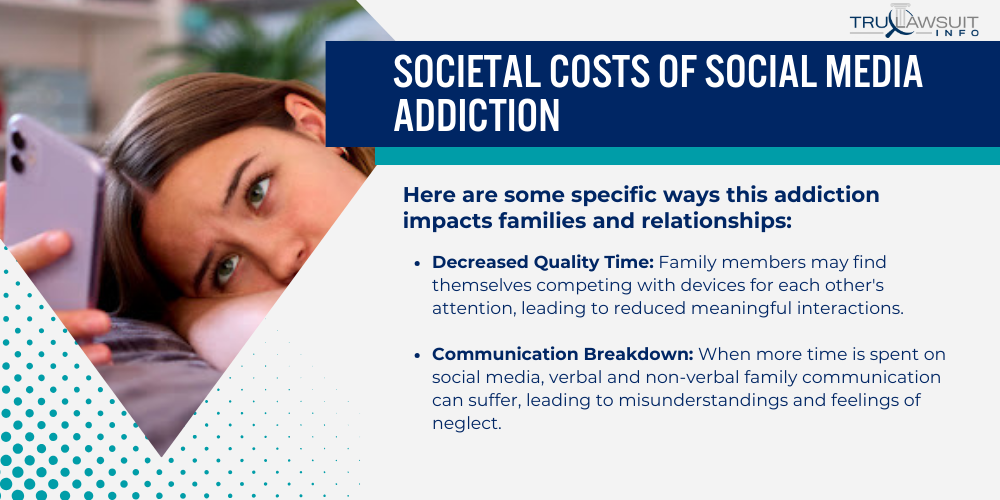
Two particularly poignant areas of impact are relational dynamics and community involvement.
Strain on Relationships and Family Dynamics
Social media addiction can lead to significant strain within personal relationships, as excessive screen time often replaces face-to-face interactions.
Here are some specific ways this addiction impacts families and relationships:
- Decreased Quality Time: Family members may find themselves competing with devices for each other’s attention, leading to reduced meaningful interactions.
- Communication Breakdown: When more time is spent on social media, verbal and non-verbal family communication can suffer, leading to misunderstandings and feelings of neglect.
- Conflict: Arguments may arise from the perceived overuse of social media or from content that one family member finds objectionable or hurtful.
- Emotional Distance: There is a risk of growing emotional distance as family members become more engaged with online connections than with each other.
Reduced Community Engagement and Civic Participation
Social media’s pervasive presence can diminish real-world interactions and civic responsibilities, leading individuals to prioritize online engagements over community involvement.
As a result, this shift can weaken communal bonds and reduce participation in civic activities.
Civic engagement is essential for a healthy community, but social media addiction can hinder this in several ways:
- Lower Volunteering Rates: Individuals absorbed by online worlds may be less likely to volunteer in local community projects or charity events.
- Less In-Person Socializing: With more time invested in virtual relationships, there is often less desire or availability to join community events or social groups.
- Voter Apathy: An endless influx of often conflicting information on social media can lead to cynicism and a reduction in participation in the democratic process.
- Weak Local Networks: Social media realms can displace local support networks, decreasing the resilience of communities to come together in times of need.
Strategies for Mitigating the Economic Impact
The economic implications of social media on body image can be addressed by integrating specific strategies within the professional environment and fostering an atmosphere that supports digital well-being.
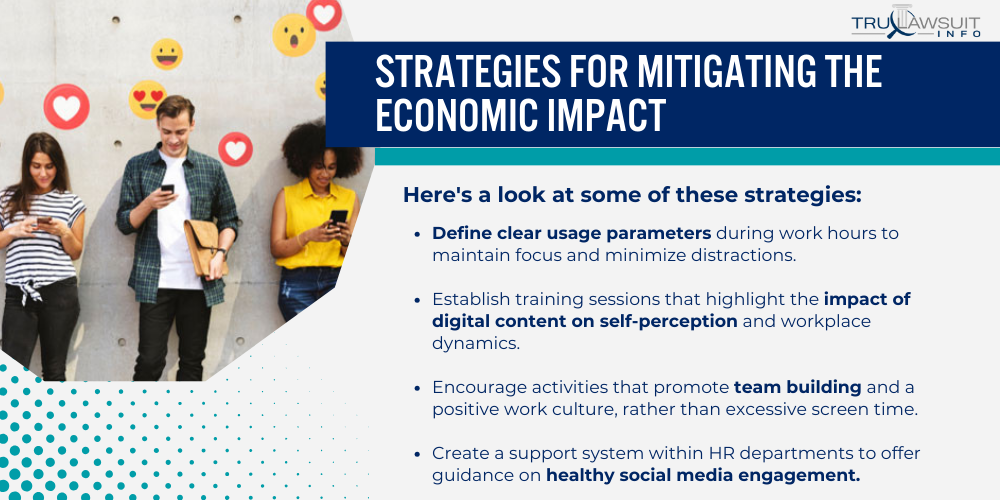
Implementing Social Media Policies in the Workplace
Organizations can optimize productivity and employee well-being by adopting robust social media guidelines.
Here’s a look at some of these strategies:
- Define clear usage parameters during work hours to maintain focus and minimize distractions.
- Establish training sessions that highlight the impact of digital content on self-perception and workplace dynamics.
- Encourage activities that promote team building and a positive work culture, rather than excessive screen time.
- Create a support system within HR departments to offer guidance on healthy social media engagement.
Promoting Healthy Social Media Habits and Digital Wellbeing
Fostering positive interactions with social media may contribute to an individual’s overall sense of well-being.
Consider these points:
- Educational programs can impart awareness regarding the influence of online content on body image.
- It is beneficial to promote the concept of ‘digital detox’ periods, where time away from screens is encouraged.
- Mental health resources should be readily available for those struggling with the impacts of social media on their body image.
- Workshops on techniques such as mindfulness and self-compassion can be offered to strengthen resilience against negative self-comparisons.
Legal Professionals Addressing the Issue
Legal professionals play a pivotal role in shaping the intersection between social media and body image.
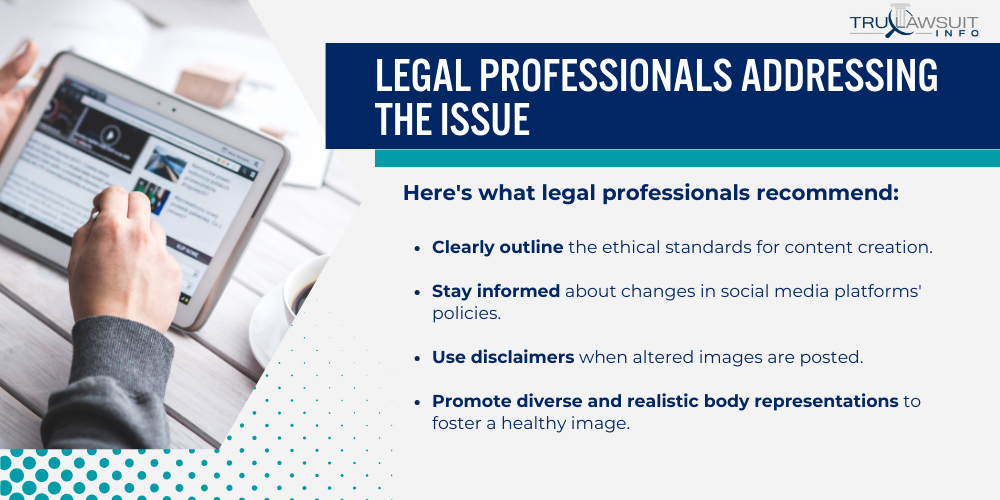
They provide clients with guidance on best practices and advocate for laws to protect those most affected by online content.
Advising Clients on Social Media Best Practices
Legal advisors are stepping in to offer clients tailored guidance on how to navigate the social media landscape responsibly.
For companies and influencers, the advice often centers around the impact of images and messages related to body image.
Here’s what legal professionals recommend:
- Clearly outline the ethical standards for content creation.
- Stay informed about changes in social media platforms’ policies.
- Use disclaimers when altered images are posted.
- Promote diverse and realistic body representations to foster a healthy image.
Advocating for Regulations to Protect Vulnerable Populations
Lawyers and policy advocates have observed the negative impact social media can have on body image and are pushing for stronger regulations.
Key areas of focus include:
- Lobbying for Transparency: Mandating platforms to identify digitally altered images.
- Youth Protection: Introducing age restrictions on certain content.
- Educational Initiatives: Sponsoring programs that teach critical media consumption skills.
- Supporting Mental Health: Pushing for resources to help those affected by negative body image issues online.
Legal professionals aim to build a safer digital environment for all users by promoting these initiatives.
Balancing the Benefits and Drawbacks of Social Media
Social media’s influence on body image is multifaceted.
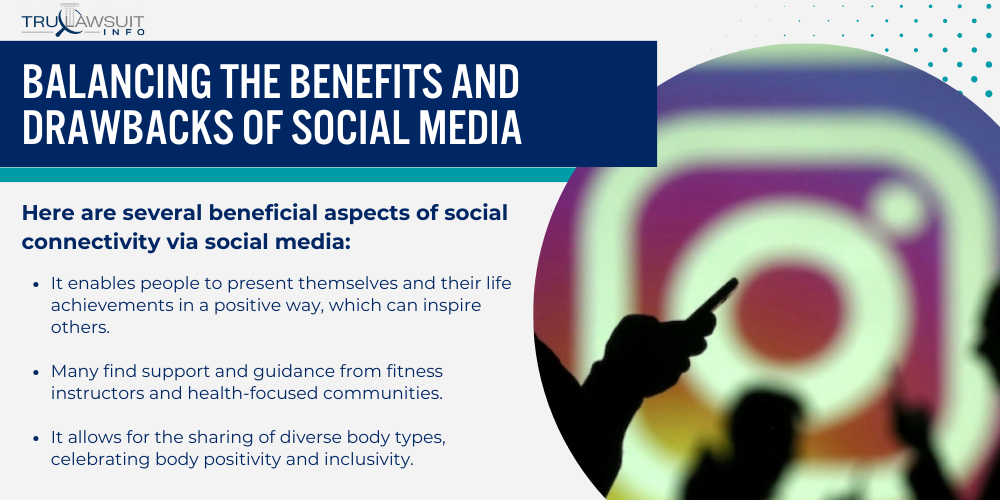
It offers positive engagement opportunities, yet the omnipresence of idealized images can foster negative self-comparisons.
Here, we’ll dissect how to harvest the good while mitigating potential harm to well-being.
Recognizing the Positive Aspects of Social Connectivity
Social media connects people in ways that were unthinkable a generation ago, giving rise to valuable positive effects.
Here are several beneficial aspects of social connectivity via social media:
- It enables people to present themselves and their life achievements in a positive way, which can inspire others.
- Many find support and guidance from fitness instructors and health-focused communities.
- It allows for the sharing of diverse body types, celebrating body positivity and inclusivity.
- Platforms can facilitate awareness and education about well-being and disordered eating.
Emphasizing these positives can help individuals foster a healthier relationship with social media.
Encouraging Responsible Use and Moderation
Promoting balanced usage is important to counter potential drawbacks, such as unhealthy social comparisons and disordered eating.
Effective strategies to promote responsible social media use include:
- Individuals can unfollow accounts that perpetuate an unrealistic ideal body type.
- Encouraging people to curate their feeds to reflect diverse, realistic depictions of bodies can reduce negative self-image.
- Setting limits on daily usage can prevent overexposure to potentially harmful content.
- Reflecting critically on why and how one uses social media can elevate its benefits.
Engaging with social media in a mindful, deliberate manner can safeguard against its detrimental aspects.
Future Outlook on the Economic Cost of Social Media Addiction
Social media addiction’s economic repercussions are increasingly becoming a concern, especially considering its influence on young adults and the broader society.
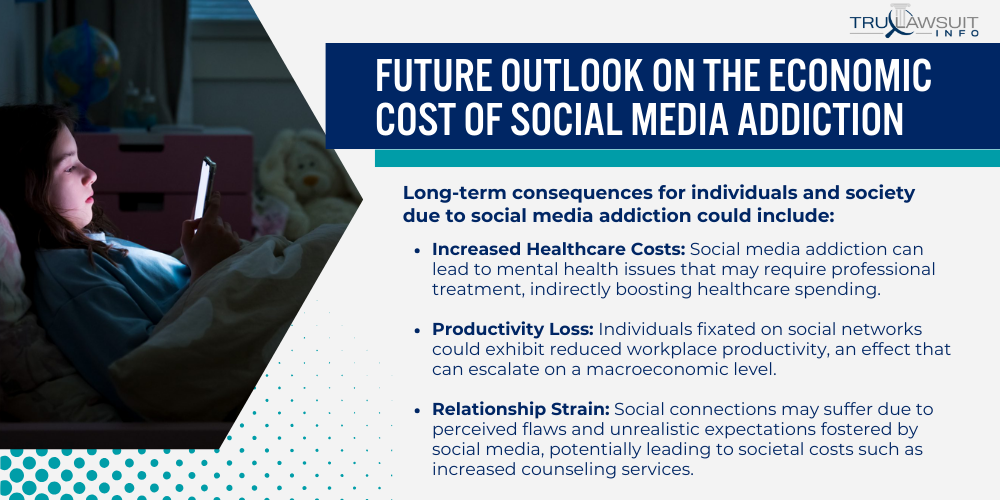
This section examines the potential long-term consequences and highlights the importance of research and policy interventions.
Potential Long-Term Consequences for Individuals and Society
The rise of social media has transformed how we communicate and perceive the world, often at the expense of deeper personal interactions and a true sense of community.
This digital shift, while connecting us globally, also isolates individuals, pushing them towards an addictive cycle of constant online engagement.
Long-term consequences for individuals and society due to social media addiction could include:
- Increased Healthcare Costs: Social media addiction can lead to mental health issues that may require professional treatment, indirectly boosting healthcare spending.
- Productivity Loss: Individuals fixated on social networks could exhibit reduced workplace productivity, an effect that can escalate on a macroeconomic level.
- Relationship Strain: Social connections may suffer due to perceived flaws and unrealistic expectations fostered by social media, potentially leading to societal costs such as increased counseling services.
- Educational Impacts: For young adults, compulsive use of social platforms could detract from educational pursuits, affecting future earnings potential and economic contributions.
Need for Ongoing Research and Policy Interventions
As the prevalence of social media addiction rises, it becomes imperative to deepen our understanding of its implications and to develop interventions that can alleviate its negative impacts.
This need propels the call for ongoing research to unravel the complexities of addiction and the creation of policies tailored to curb its growing influence.
To understand the economic cost of social media addiction, we need:
- Longitudinal studies to track data over time and illuminate the progression and long-term economic effects of this addiction.
- Policies aimed at reducing screen time amongst the populous could mitigate some of these costs through proactive public health measures.
- Employer-driven initiatives that support healthy digital habits could alleviate productivity downturns.
- Awareness campaigns can help individuals recognize the negative effects of social media overuse and encourage healthier behaviors.
TruLawsuit Info: #1 Social Media Lawsuit Attorneys
TruLawsuit Info is a leading law firm that specializes in social media harm.
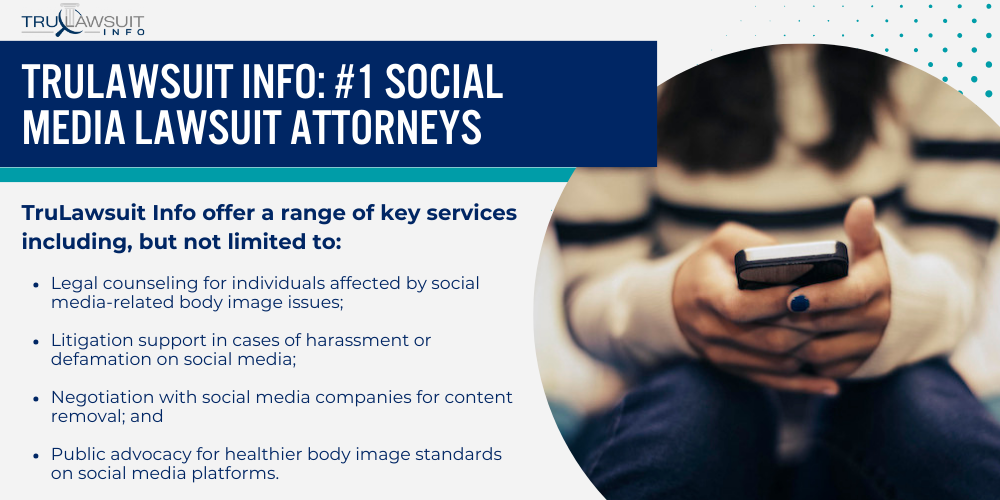
We have a reputation for representing clients who face body image issues due to social media’s negative impacts.
TruLawsuit Info offer a range of key services including, but not limited to:
- Legal counseling for individuals affected by social media-related body image issues;
- Litigation support in cases of harassment or defamation on social media;
- Negotiation with social media companies for content removal; and
- Public advocacy for healthier body image standards on social media platforms.
TruLawsuit Info’s approach involves conducting a strategic analysis of each client’s unique situation, providing personalized attention to the emotional aspects of clients’ cases, and focusing on achieving resolutions that account for mental and emotional distress.
Clients choose TruLawsuit Info because they are knowledgeable about current laws affecting social media and body image, they have experience in handling high-profile social media cases, they are dedicated to providing clear and fair legal advice, and they have the ability to communicate effectively with all parties involved.
Frequently Asked Questions
-
Research indicates a significant relationship exists between social media use and increased body image concerns.
For instance, an analysis highlighted on ScienceDirect suggests that frequent interaction with image-centric social media platforms can lead to a greater degree of body dissatisfaction.
-
Social media platforms can contribute to body dissatisfaction through constant exposure to idealized images, leading to unfavorable comparisons.
A study published on Liebert Pub discusses how activities like viewing and editing photos on Facebook are associated with higher levels of body image disturbance among adolescent girls.
-
Social media has played a pivotal role in reshaping societal beauty standards by frequently circulating a certain ideal of physical appearance.
This is further discussed in a book available via Taylor & Francis, which explores the influence that media and celebrities have on individuals’ perceptions of beauty and self-worth.
-
Individuals can mitigate the impact of social media on body image by engaging in media literacy, fostering a positive social media environment, and limiting exposure to potentially harmful content.
Engagement with body-positive communities and content can also serve as a buffer against the pressure of idealized standards.
-
Statistical analyses show a link between social media exposure and body image perception, with increased usage often correlating with heightened dissatisfaction and concern about body image.
A study from ScienceDirect provides experimental evidence of the impact that platforms like Facebook can have on young women’s body image and mood.
-
Social media engagement can be a contributing factor in the development of body dysmorphic disorders.
This is especially true when users habitually compare themselves with the curated images they encounter online.
Research published in Sage Journals examines the role of social comparison and celebrity involvement in fueling body image dissatisfaction.
This can evolve into body dysmorphia.

Attorney Jessie Paluch, founder of TruLawsuit Info, has over 25 years of experience as a personal injury and mass tort attorney, and previously worked as an international tax attorney at Deloitte. Jessie collaborates with attorneys nationwide — enabling her to share reliable, up-to-date legal information with our readers.
Legally Reviewed
This article has been written and reviewed for legal accuracy and clarity by the team of writers and legal experts at TruLawsuit Info and is as accurate as possible. This content should not be taken as legal advice from an attorney. If you would like to learn more about our owner and experienced injury lawyer, Jessie Paluch, you can do so here.
Fact-Checked
TruLawsuit Info does everything possible to make sure the information in this article is up to date and accurate. If you need specific legal advice about your case, contact our team by using the chat on the bottom of this page. This article should not be taken as advice from an attorney.
You can learn more about the Social Media Harm Lawsuit by visiting any of our pages listed below:
Here, at Tru Lawsuit Info, we’re committed to helping victims get the justice they deserve.
To do this, we actively work to connect them with attorneys who are experts in litigating cases similar to theirs.
Table of Contents
Tru Lawsuit Info is a reliable source of information about issues that may affect your health and safety, such as faulty products, data breaches, and environmental hazards.
Our team of experienced writers collaborates with medical professionals, lawyers, and advocates to produce informative articles, guides, and other resources that raise awareness of these topics.
Our thorough research provides consumers with access to reliable information and updates on lawsuits happening around the country. We also can connect consumers with attorneys if they need assistance.
Here, at Tru Lawsuit Info, we’re committed to helping victims get the justice they deserve.
To do this, we actively work to connect them with attorneys who are experts in litigating cases similar to theirs.
